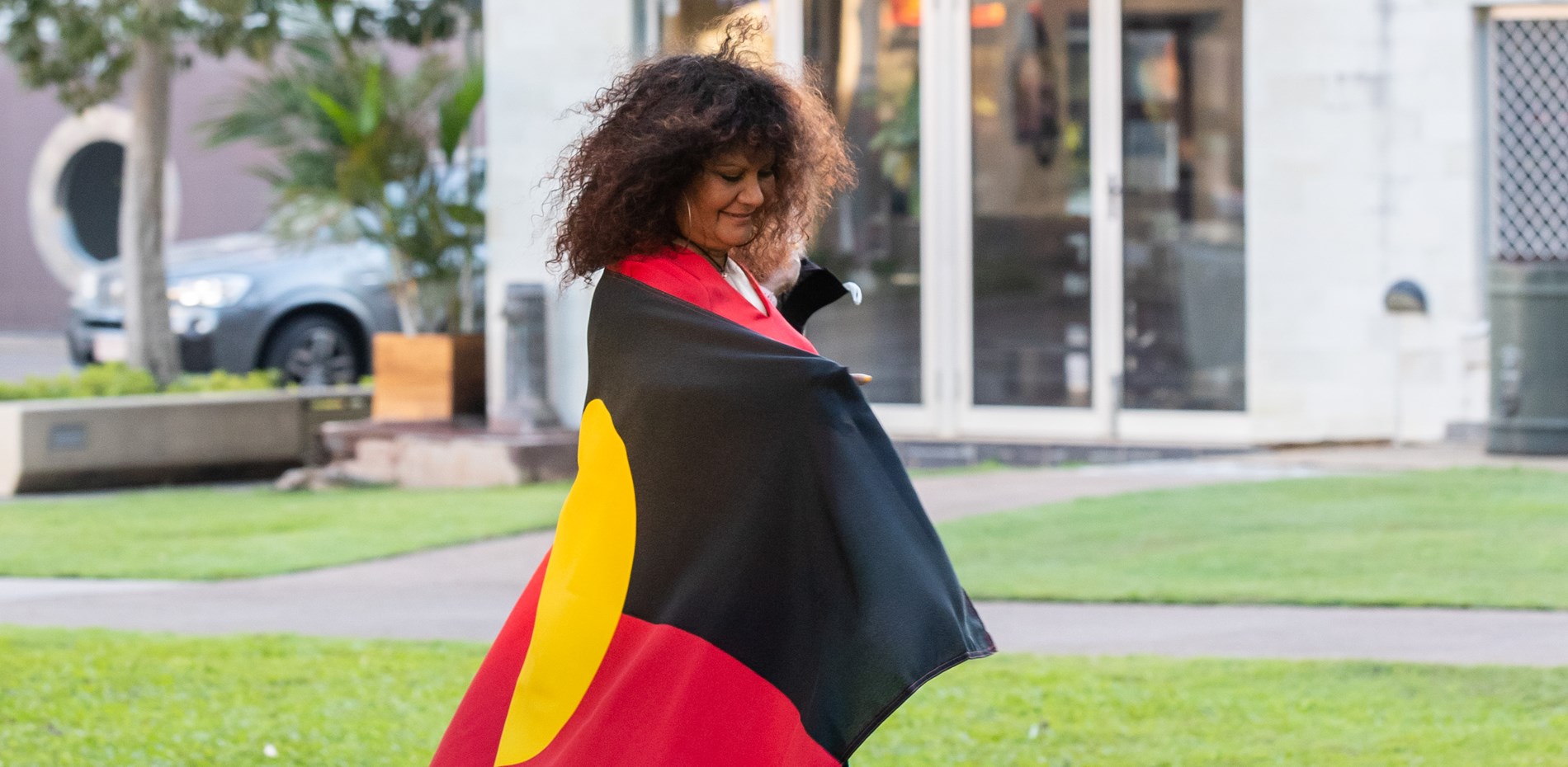FI POOLE, ABC COFFS COAST: The controversy has now boiled over into a Senate Inquiry which has held a series of five public hearings over the last fortnight, and they will be reporting on October the 24th. The inquiry committee chair is Labor Senator for the Northern Territory and Garrwa and Yanyuwa woman Malarndirri McCarthy. Malarndirri joins us now. Morning. Thanks for joining us on the program.
MALARNDIRRI MCCARTHY: Good morning. Good morning to your listeners.
POOLE: What are the parameters for this inquiry, what exactly were you looking into?
MCCARTHY: Look, our terms of reference include looking at who benefits from payments of the use of the Aboriginal flag design, also options available to the government re you know, to enable the flag design to be freely used, looking at negotiated outcomes, but also look at any other matters relevant to the enduring and fair use of the Aboriginal flag design by the Aboriginal Australian community.
POOLE: Do you think the government is open to buying back the copyright, buying the flag?
MCCARTHY: Well that's a question you'd have to put to Minister Ken Wyatt. What the Senate is doing in terms of this inquiry is actually to enable the voices of First Nations people across the country and organisations, but more broadly, you know, anyone who wants to give their views about their use of the flag. And that's what this inquiry is really about, is getting to the heart of what has this impact been, certainly in the most recent 12 months.
POOLE: And what has that impact been? What have we heard so far?
MCCARTHY: Look, it's quite sad, actually, Fi. You're hearing from grassroots organisations, whether it's sporting groups, health organisations who have been sent what's known as cease and desist letters by a particular company that holds the licence from the creator of this flag. And the creator of the flag is Luritja man, Mr Harold Thomas. Now he has the copyright, as identified in Laura's comments there. And Mr Harold Thomas has the copyright and he, like anyone who holds copyright, is able to pass on the license to others. In this instance, though, one of those organisations is sending cease and desist letters. And that's really hurt First Nations people. We've had evidence of people saying they've had to pay ten thousand dollars just to have the flag on their sporting uniforms when they go out in the field to play rugby league.
POOLE: Wow. Have you spoken with Harold Thomas?
MCCARTHY: We've sent letters to Mr Thomas. Clearly, he's in fairly sensitive negotiations with Minister Wyatt and we're very aware that that is occurring. But the problem is, Fi, is that this has gone on for over 12 months, 18 months almost. And it's getting to the point where the division and frustration is so great that in our submissions we're also receiving calls for the possibility of creating a new flag.
POOLE: Oh, whoa. Say that again for me.
MCCARTHY: That is huge, yes I know. I've had to, I've had many sleepless nights with this inquiry, let me tell you but, you know, there are submissions coming forward saying, look, we greatly respect the creator here in Harold Thomas and that he should have the copyright. However, people feel that they're being held to ransom by the way that this particular licence is being held. Now, if there can't be a negotiated agreement between the government and Mr Harold, then as submissions, submitters are saying, let's hold a competition and create a new flag.
POOLE: But the flag means so much already, I mean, even today, it's the 20th anniversary of the Sydney Olympics and that incredible night that Cathy Freeman won gold in the 400 metres. And, you know, she stood there with both flags and she wrapped that Aboriginal flag around her. And it was such a such a moment for all of Australia to watch her do that. Oh, it would. It would. I don't know it's already got so much meaning that flag to so many.
MCCARTHY: And who would have thought that 20 years later we'd be at this point, you know, and these are the things that obviously our committee is wrestling with as we listen to many people who've been giving evidence to us. No one is, no one is really saying let's go off and create a flag. They're getting to that point because of the weariness, the frustration, the despair and the division that's being created by this particular company.
POOLE: Well, let's hope negotiations go well. What would happen, do you think, if it did say, best outcome, you know, that the flag was free and given the same rights as all other flags? What would that mean for Aboriginal people and all Australians?
MCCARTHY: Well, look, the flag's been out there since 1971, Fi. Next year's its fiftieth anniversary when it was first flown in Adelaide and then moved, you know, to the East Coast. So I think it what it would certainly mean is that those people who have been using the flag have been able to use it quite well up until almost 18 months ago. So they can be returned to the way it was prior to that, then I think most people will be fairly happy but what they won't put up with is being held to ransom.
POOLE: So great to get you on. Thanks for joining us.
MCCARTHY: No worries. Thank you, Fi.


